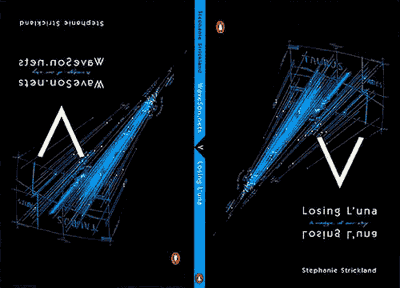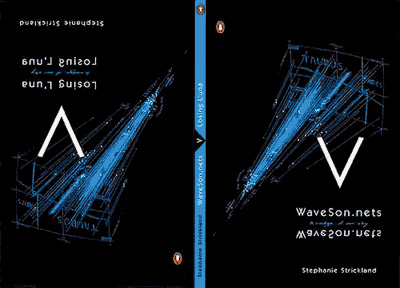

Winner, Poetry Society of America's Alice Fay Di Castagnola Award, selected by Brenda Hillman
Review of V : Vniverse and V : WaveSon.nets / Losing L'una by Chris Funkhouser Review of V : Vniverse and V : WaveSon.nets / Losing L'una by Edward Falco Review of ELC/2 by John Zuern "The Death and Re-distribution of V" in #WomenTechLit, 2017 Making the Vniverse essay by Strickland and Lawson Jaramillo Interview with Strickland about V and True North trAce article about Strickland
V exists in print and on the Web as one work. In print, it is an invertible book with two beginnings (V : WaveSon.nets / Losing L'una, Penguin 2002); online, it has two additional parts: V : Vniverse (with Cynthia Lawson Jaramillo) and Errand Upon Which We Came (with M.D. Coverley).
V : Vniverse appears in the Electronic Literature Collection 2, 2011, edited by Laura Borràs, Talan Memmott, Rita Raley, and Brian Kim Stefans.
“Strickland’s lyric poetry reads the entire gamut of knowledge – ‘from sails to satellites’ and from shadows and spectres to spectral analysis – through the figure of Simone Weil, for whom knowledge of the spirit was to be attained by lived proof. Imagine this, and you will appreciate how a lyric poetry of such ethereal embodiment can be made to scintillate through hypertext, linked to lines of flight and seeming fantasy. Yet the really good news is that Strickland puts the lyric poem to the test as if, quite as much as music, it were the very instrumentality of a quickening mind.”
— Marjorie Welish
“In V the poetics of Wittgenstein and Weil – quotidian, notational, mathematical, emotional – are revisited and re-formed. They are, in a word, saved. This is a thrilling work that is above all useful.”
— Fanny Howe
“Stephanie Strickland is one of a handful of outstanding writers working to forge poetic forms at the intersection of technological innovation and the tradition of experimental writing. V is radical in integrating new technology, not as a novelty or special effect, but as a way of thinking.”
— Johanna Drucker
“Strickland has a sassy, funny mimic’s sense – but also a steely sense of grammar and structure – traditional forms are included, inverted, abstracted, sent up – but attended to…[T]he elegiac feel of these poems is haunting and passionate, inspiring the reader to listen to the ‘waveforms’ of the human voice. They read like the one long episodic dream of a being who exists between atmospheres, like a mermaid: From WaveSon.net 2: ‘If you understand red, you understand ruby, / you understand light bubbling up struck seam / first morning cliff; you do not / mock the real / as you watch it subside and divide and then run / like morning into the virtual.’”
— Carol Muske-Dukes